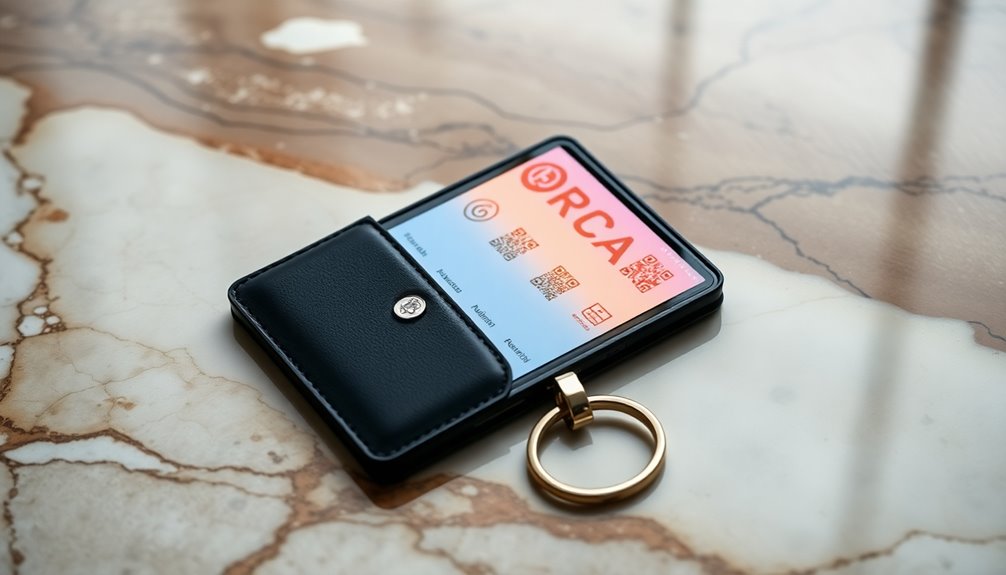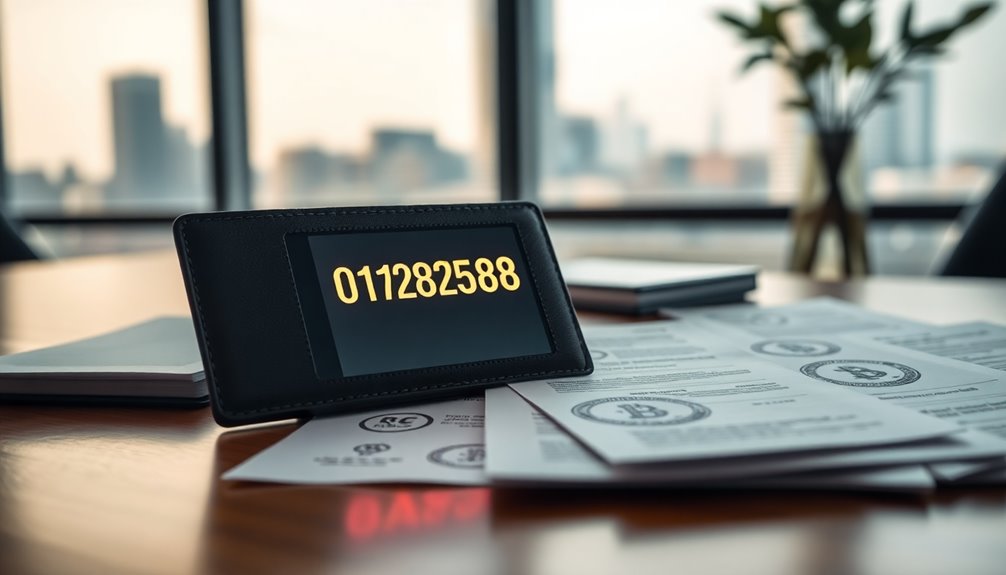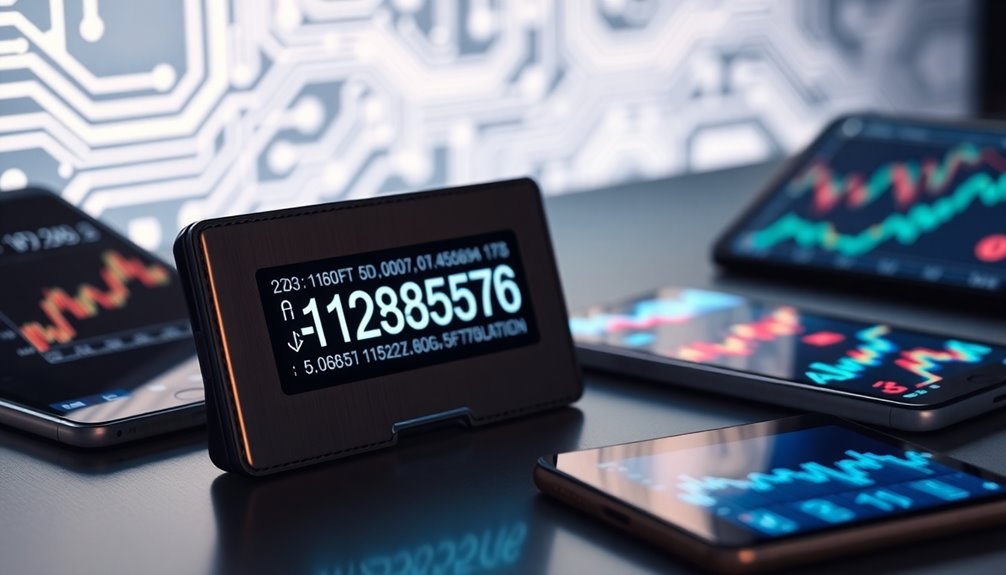A crypto wallet works using a pair of keys: a public key and a private key. The public key acts as your wallet's address, a unique identifier for transactions. When you want to send crypto, you enter the recipient's public key. You then use your private key to sign the transaction, ensuring it's secure. It's crucial to keep your private key confidential, as anyone with it can access your funds. With millions of users engaging with cryptocurrencies, understanding these key mechanics helps you navigate the space better. Stick around to uncover more about wallet security and transaction processes!
Key Takeaways
- A crypto wallet stores a public and private key pair, crucial for initiating and signing transactions securely.
- The public key acts as a unique identifier, while the wallet address is a simplified version used for transactions.
- The private key must remain confidential, as sharing it compromises the wallet's security and control over funds.
- Transactions are initiated using the recipient's public key, signed with the sender's private key, and verified by the network.
- Secure wallets are essential for protecting private keys from various threats, ensuring the safe management of cryptocurrency assets.
Understanding Crypto Wallet Mechanics

When you dive into the world of cryptocurrencies, understanding crypto wallet mechanics is essential for managing your digital assets effectively. Your wallet comprises a public and private key pair. The public key acts as your blockchain account's unique identifier, while the private key controls your account and signs transactions. You should never share your private key to maintain security. In addition, the importance of secure wallets cannot be overstated, as they safeguard your private keys against potential threats.
When you send or receive cryptocurrencies, you use your wallet address, a simplified version of your public key. This alphanumeric string allows you to interact with the blockchain.
The transaction process involves initiating a transfer with the recipient's public key, signing it with your private key, and then having the network verify it before the transaction is recorded on the blockchain.
Regulatory Changes Impacting Cryptocurrencies

As the cryptocurrency landscape evolves, regulatory changes are shaping how you and others interact with digital assets.
The EU's MiCA regulation and the OECD's CARF are setting new standards for oversight and tax reporting, enhancing transparency. This comprehensive regulation is the first in the world to require licenses for companies trading or issuing cryptocurrencies. These regulations are also promoting the implementation of decentralized control in cryptocurrency transactions.
In Brazil, the central bank now supervises crypto assets to prevent scams, while the UK's FCA mandates authorization for digital currency providers.
In the U.S., both state and federal regulators are working to clarify the landscape, focusing on licensing and consumer protections.
New tax compliance requirements starting in 2025 will impact centralized exchanges, and updated accounting standards are on the horizon.
These shifts aim to safeguard against fraud and ensure a more stable, transparent market for everyone involved.
Market Volatility and Price Fluctuations

Market volatility and price fluctuations are inherent features of the cryptocurrency landscape, driven by various factors that affect supply and demand.
Limited supply, like that of Bitcoin, can lead to significant price increases when demand rises. Whale activity can also drastically shift prices as large holders buy or sell.
The crypto market's inefficiency means it can't absorb shocks without notable price impacts. With lower liquidity, price swings become more pronounced, making smaller assets even more volatile. Additionally, market liquidity plays a crucial role in determining how easily assets can be traded without causing drastic price changes.
Regulatory announcements can further stir the pot, causing investor reactions that amplify volatility.
Lastly, psychological factors, such as herd mentality and emotional responses to market news, can lead to rapid changes in market conditions, influencing your investment decisions significantly.
Corporate Investment Strategies

While companies navigate the complexities of the financial landscape, effective corporate investment strategies become crucial for sustainable growth.
Start by conducting thorough market analysis to identify opportunities and assess potential risks. Use data analytics tools like SWOT analysis to deepen your understanding.
Diversification is key; spread investments across sectors to mitigate risk and manage volatility. Regularly monitor your portfolio to ensure it remains balanced.
Don't forget about risk assessment—evaluate investment risks and conduct due diligence before committing to any asset. Implementing a solid risk management framework can further enhance your investment decisions.
Finally, consider forming strategic alliances with other companies. Collaborations can open new markets and enhance growth opportunities, ultimately improving your competitive advantage.
With these strategies, you'll position your company for long-term success.
Election Outcomes on Crypto Markets

Election outcomes can significantly impact crypto markets, often leading to notable price fluctuations and shifts in investor sentiment.
For instance, after the 2016 election, Bitcoin soared from $1,000 to over $10,000 within a year. In 2020, Ethereum investments also experienced significant surges. Historical data indicates strong performance of major cryptocurrencies post-election, reinforcing this trend. This is particularly relevant for Bitcoin IRA investments, as the tax-efficient growth offers unique advantages during market volatility.
The volatility surrounding elections can create both opportunities and risks for traders. Positive sentiments generated by new leadership often lead to post-election booms in crypto markets as investors feel more confident.
Additionally, the president's influence on regulatory bodies can shape the crypto landscape, impacting policies that either promote or restrict growth.
As you navigate these changes, stay cautious; the market's reaction to political uncertainty can be unpredictable.
Emerging Technologies Shaping Crypto

As the crypto landscape evolves, emerging technologies are playing a pivotal role in shaping its future.
You'll see interoperability solutions like Polkadot and Cosmos enabling seamless communication between blockchains, fostering a cooperative ecosystem.
AI is transforming networks by automating processes and enhancing smart contracts, making systems more efficient and user-centric. Furthermore, institutional interest in cryptocurrencies is growing, as traditional investors increasingly view crypto as viable portfolio additions.
The tokenization of real-world assets is unlocking new investment opportunities, as seen with BlackRock's tokenized funds.
However, quantum computing poses security risks that could disrupt cryptocurrencies, necessitating preparation within the community.
As these technologies converge, they not only enhance scalability and innovation but also redefine how you interact with the crypto world, making it more accessible and secure.
Frequently Asked Questions
How Do I Create a Crypto Wallet?
To create a crypto wallet, start by selecting the right type for your needs—choose between custodial or non-custodial and hot or cold wallets.
Next, download the wallet app from a reputable source and create an account, if required.
Once set up, your wallet will generate an address for sending and receiving cryptocurrencies.
Remember to secure your private keys, as they're crucial for accessing your funds.
Enjoy exploring the crypto world!
What Is the Difference Between Hot and Cold Wallets?
The difference between hot and cold wallets lies in their connectivity and security.
Hot wallets are always online, making them convenient for quick transactions but more vulnerable to hacking.
In contrast, cold wallets store your assets offline, providing enhanced security but requiring manual steps for transactions.
If you prioritize speed and ease, hot wallets might suit you.
However, if security is your main concern, you'll want to consider using cold wallets.
Can I Recover My Wallet if I Lose Access?
Losing access to your wallet can feel like misplacing a key to a treasure chest.
Fortunately, you can recover it in several ways. If you've got your seed phrase, simply enter it into your wallet app to regain access.
Alternatively, if you've made a backup, you can restore it using that.
For more complex situations, consider using recovery programs or consulting specialized recovery companies to help you retrieve your assets.
What Security Measures Should I Take for My Wallet?
To secure your wallet, use a hardware wallet for offline key storage and enable biometric authentication for access.
Regularly back up your wallet and store backups in different secure locations.
Implement strong encryption protocols like AES-256 for your private keys, and always use VPNs when accessing your wallet.
Monitor for suspicious activity and conduct regular audits.
Lastly, ensure you have a well-defined incident response plan in place for any security breaches.
Are There Fees Associated With Using Crypto Wallets?
Yes, there are fees associated with using crypto wallets.
You'll encounter blockchain network fees, which vary based on congestion, and some wallets charge flat transaction fees.
Centralized exchanges also impose fees for trades, influenced by factors like trading volume and asset type.
Additionally, if you use credit cards, banks might charge processing fees.
Always check for estimated fees before transactions to avoid surprises and ensure you're making informed decisions.
Conclusion
In the ever-evolving world of cryptocurrencies, your crypto wallet acts like a digital vault, safeguarding your assets amid market volatility. While regulatory changes can feel like a storm, they also bring clarity and legitimacy. Just as corporate investments signal growing trust, election outcomes can shift the landscape overnight. As emerging technologies reshape the crypto space, you'll find both challenges and opportunities at every turn. Embrace the journey, because in this dynamic realm, change is the only constant.









